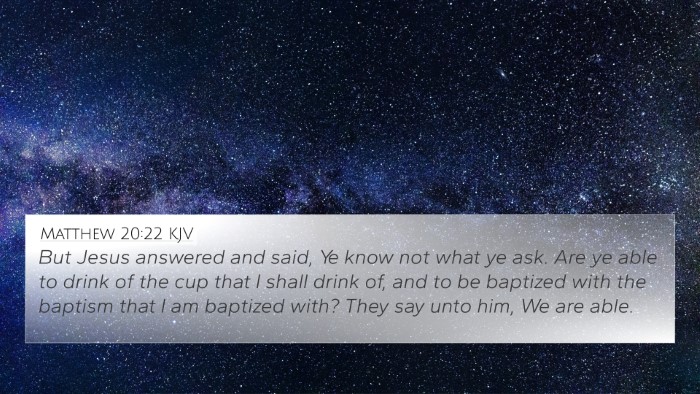Understanding Matthew 26:35
The verse Matthew 26:35 states: “Peter said to Him, ‘Even if I have to die with You, I will not deny You!’ And all the disciples said likewise.” This passage captures a moment of strong declaration by Peter, showcasing his zealous commitment to Jesus amidst the foreboding circumstances of impending betrayal and crucifixion.
Summary of Insights from Commentaries
Matthew Henry's Commentary
Matthew Henry emphasizes Peter's impassioned vow, interpreting it as an expression of genuine courage but also highlighting its eventual failure. He notes that Peter's declaration reflects a common human tendency to overestimate one's own strength and commitment when faced with danger. Henry warns that this serves as a lesson about the need for humility and reliance on God rather than self-confidence.
Albert Barnes' Commentary
Albert Barnes views this declaration as reflective of Peter's love and dedication to Jesus. He points out that despite the bold assertion, Jesus had forewarned Peter of his upcoming denial. Barnes underscores the importance of recognizing the frailty of human resolve when stripped of divine support, highlighting the theme of reliance on God's strength.
Adam Clarke's Commentary
Adam Clarke provides additional context by discussing the implication of Peter's words in relation to the other disciples’ similar affirmations. Clarke notes that there is a collective boldness among the disciples that demonstrates their camaraderie but also foreshadows their impending fear and abandonment. He reflects on the importance of spiritual preparedness and the dangers of presumption when it comes to faith.
Inter-Biblical Dialogue and Cross-References
This verse does not stand alone in scripture; it is enriched by various themes and insights present in other biblical passages. Here are some significant cross-references that relate to Matthew 26:35:
- Matthew 26:34: Jesus predicts Peter's denial, which emphasizes the contrast between Peter's confidence and the reality to come.
- John 13:38: Jesus responds to Peter's proclamation and reinforces the prediction about Peter's denial.
- Mark 14:30: Similar to Matthew, Mark reports Peter's bold declaration, highlighting the theme of denial.
- Luke 22:34: Luke presents Jesus' warning to Peter with a focus on Satan's desire to sift him like wheat.
- 1 Corinthians 10:12: This verse cautions believers to take heed lest they fall, echoing the warnings Jesus provides to His disciples.
- Proverbs 16:18: “Pride goes before destruction,” resonating with Peter’s overconfidence in his loyalty.
- Galatians 6:1: This encourages humility among believers, reminding them to restore those who fall with gentleness.
Thematic Connections
Exploring the connections between Matthew 26:35 and other scripture reveals deeper themes of faith, loyalty, and human frailty:
- Strength in Weakness: 2 Corinthians 12:9 emphasizes God’s strength being made perfect in our weakness.
- Forgiveness and Restoration: John 21:15-17 highlights Jesus' reinstatement of Peter after his denial.
- The Cost of Discipleship: Luke 14:27-33 discusses the sacrifices involved in following Christ, paralleling Peter's earlier declarations.
Cross-Referencing Tools and Methods
Utilizing tools for Bible cross-referencing can enrich understanding and help in comparative Bible verse analysis:
- Bible Concordance: A valuable resource that lists verses by keywords and topics, aiding in finding related passages.
- Bible Cross-Reference Guide: These guides provide systematic ways to link verses across texts, highlighting themes.
- Cross-Reference Bible Study: Methods that involve examining similar themes and narratives in different book contexts.
Individual Reflection and Application
Ultimately, the study of Matthew 26:35 invites a personal reflection on commitment to Christ, the reality of human frailty, and the assurance of grace through forgiveness. By engaging deeply with this verse and its related texts, one grows in understanding the dynamic relationship between faith and doubt, loyalty and betrayal.
Conclusion
In summary, Matthew 26:35 serves as a profound reminder of the complexities of human devotion to God, the forewarnings of scripture, and the interconnectedness of Biblical themes. By cross-referencing related biblical texts, we not only gain insights into Peter's character but also into the wider narrative of grace, redemption, and the transformative power of Christ's love.











